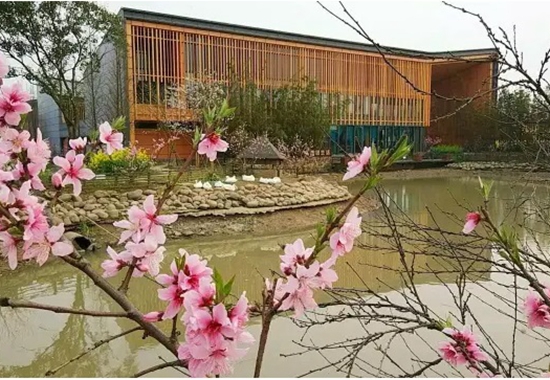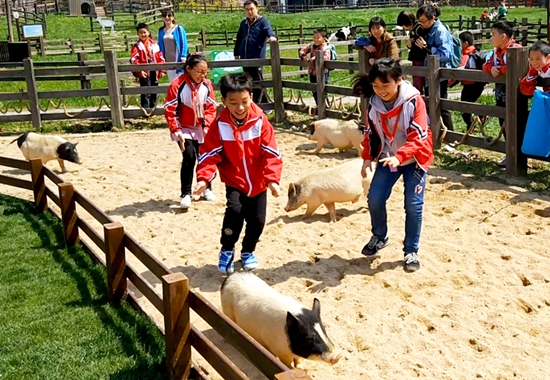Exploring the way of "Pastoral complex" in Yangshan, Wuxi: the complex of "Sansheng" and "Sanjie"
In the place where peach blossoms are in full bloom, while sipping coffee, while enjoying the beautiful scenery, soft music floats from time to time. This is a village in Yangshan Town, Wuxi. It is early in spring in the south of the Yangtze River, and it will "burn its bloom" here in March. Yangshan Town is known as "the hometown of Chinese peaches". Four years ago, Zhang Cheng, who returned to the "field", began to build a "pastoral complex" here.
In order to break down the cultural barriers between urban and rural areas, Zhang Cheng also opened his first coffee shop in Yangshan, so that villagers can not only see city people who enjoy coffee on their own land, but also feel, experience and even join the ranks of coffee drinkers. in order to achieve the integration and interaction of different people.
Who says garlic eaters can't be with coffee drinkers? But in Yangshan, it is not easy to let peach blossoms and black coffee smell together.

As the No. 1 document of the Central Committee put forward for the first time in February this year, the concept of "pastoral complex" attracted market attention. According to the document entitled "opinions of the CPC Central Committee and the State Council on deepening the supply-side structural reform of agriculture and speeding up the cultivation of new momentum for agricultural and rural development", the pastoral complex should "integrate circular agriculture, creative agriculture and agricultural experience". It can be said that the pastoral complex connects with the beauty and vitality of the countryside, leading to the paradise and pastoral dream of urbanites, and the promotion of rural commercial value can better promote the development of the new countryside and promote the solution of the social employment problem.
"keep the room under the knife"
To return to the countryside, pastoral ecology is indispensable.
Take the village house as an example. Originally, the "pickup house village" was a complete village. after all the villagers moved in 2013, some houses were demolished or collapsed, but in order to maximize the preservation or restoration of the natural form of the village, Zhang Cheng told China Business News that he wanted to "keep the house under the knife."
Zhang Cheng is the founder and chairman of Garden Oriental Investment Co., Ltd. (hereinafter referred to as "Garden Oriental") and CEO. His early experience working in a large commercial real estate company made him choose to do the project from a sustainable perspective of the business model.
On the basis of fully respecting the natural ecology of Yangshan and the historical memory of Xifang Village, the original site of the project, the project selected ten old houses for renovation and protection in accordance with the way of "repairing as old as the old", and preserved the ancient wells, ponds and native trees in the village, thus preserving the natural form of the village to the greatest extent.
While planning, designing and building the old house, the project implanted new formats and activities into it, and carried out interior design for different formats of space, integrating all imaginable forms of Lehuo shop, academy, coffee, theme accommodation and so on.
Protecting the rural style and environment while enhancing the rural commercial value are the two sides of the "pastoral complex".
That's not all. Through the organic combination and related symbiosis of "Sansheng" (production, life, ecology) and "three industries" (agriculture, processing industry, service industry), the project covers the compound functions of ecological agriculture, leisure tourism, pastoral housing and so on. organically combine new industries with rural development.
Zhang Cheng told China Finance and Economics that the idea of the pastoral complex comes from the urban complex.
In his view, the pastoral complex is a methodology, which can be regarded as not only a way to realize a characteristic town, but also a business model. "complex" should be a cross-industry, cross-functional comprehensive planning; specific to the project, it is a multi-functional, multi-format integrated operation.
According to Zhang Cheng's understanding, the reason why the central government will consider introducing the concept of "pastoral complex" also reflects the agglomeration effect caused by "cross-industry and cross-function". To solve the problems of agriculture, rural areas and farmers, we cannot think on a single line and talk about rural areas.
In the more than four years since the transformation of the "pickup Village", what he has experienced most is the cultural integration between urban and rural areas. He said that rural people yearn for cities, and urban people want to return to the countryside. Although there is an urgent need for interaction, there is no very successful model to solve these problems.
Zhang Cheng told Caijing that under the framework of the urban-rural dual structure, when a city dweller and a rural resident face to face, it is very difficult for them to blend in with each other-because different identities lead to different treatment. If we want to completely break the dual structure of urban and rural areas and develop in an integrated way, we can't simply stay on the materialized level of "letting farmers go upstairs".
He said: although the goal of the new type of urbanization is people-oriented, and specifically emphasizes the need to focus on improving the consistent municipal infrastructure between urban and rural areas, as well as the welfare of education, medical, and other public resources, now that farmers go upstairs and see a doctor, this is only a change in space and material, but people and culture have not changed. Therefore, Pastoral Oriental has to do more connotative things in addition to materialized things. Urban and rural areas need the integration of civilization in order to achieve the integration of inner ideas.
Let the villagers taste coffee on their own land
Taking a stroll in the "picking up the house village", the urban civilization represented by coffee is coming.
For example, Pastoral Oriental has introduced sweet potato vine TINA, a well-known organic catering brand in Taiwan, to provide villagers and tourists with drinks such as juice, coffee, milk tea and handmade bread.
The future "pastoral complex" may be the combination of pastoral scenery and urban life style.
Zhang Cheng said that allowing villagers and tourists to drink coffee is not the most important thing, but to show that the urban way of life and leisure can also be found in the countryside. For the villagers, the pastoral complex is also a window to get in touch with the outside world and open their horizons, where different cultures interact.
He believes that in the dual structure of urban and rural areas, the differences at the material level are external, and more importantly, the differences at the cultural level. What is particularly important is that the cultural difference is not a matter of who is smarter than whom, but only determined by the different conditions of the two. Compared with the former, the healing of the latter takes a long time. And the best way is to interact between urban and rural areas, put the two civilizations together to achieve the flow of life, social, information, so as to achieve the integration of civilizations. From this point of view, does it make sense to open a coffee shop in the countryside?
Industry is the core of pastoral complex. Document No. 1 says that it "supports the construction of conditional villages". From the point of view of the industry, the so-called "conditional" refers to local industries with unique characteristics, distinctive cultural landscapes, and ecological resources.
The project of Yangshan Pastoral complex can be summarized into four parts: agriculture, cultural tourism, real estate and community management services of the park, which are respectively operated by corporatized main bodies.
Zhang Cheng regards the real estate sector in the project as a carrier that can support the investment. at the same time, it is also the need for township population to gather to form a new community when the new industrial agglomeration is completed. In his view, in most areas, the real economy, such as agriculture and tourism, is difficult to play a leading role in the business model for the time being, and it takes time to exchange for space.
At present, the rural areas are facing a dilemma, that is, under the premise that it is impossible to fully liberalize the rural land market, financial institutions and other investors are unable to find a fast-growing industrial sector in rural areas. "the rural land market is afraid to let go and is afraid of chaos, but it is not open and there is no carrier to support it, so that investment is possible, which leads to the failure of rural development."
However, there are not many factor markets that can be used to explore in rural areas. In addition to agricultural products, labor, and land. He believes that the market element of land must be activated to a certain extent and used for industrial development and use.
Like the characteristic town, once it came out, the concept of "pastoral complex" was also sought after by the market.

The interactive amusement area of the "pick up the Housing Village" complex project.
The No. 1 document, which aims to activate the market, the elements and the subject, endows the "three zones, three parks and one body" with the responsibility of "grasping, platform and carrier". Among them, "one" refers to the "pastoral complex". Through these "grasping" construction, the central government hopes to optimize the industrial structure in rural areas, promote the deep integration of the three industries, gather various rural funds, science and technology, talents, and projects, and speed up the development of modern agriculture.
According to Zhang Cheng's experience, under the policy encouragement, some resources in rural areas will be released, and profit-seeking enterprises can only invest in some of them. However, the countryside needs meticulous farming and long-term management, which is not an area where quick money can be made in the short term and high returns can be made. Generally speaking, the government needs to consider as a whole, policy-based financial support and arrangements are indispensable; of course, to invigorate the "pastoral complex" with the help of social capital is also the hope that the operating institutions behind it, play a creative role in business operation and capital recovery.
Important Notice :
前街咖啡 FrontStreet Coffee has moved to new addredd:
FrontStreet Coffee Address: 315,Donghua East Road,GuangZhou
Tel:020 38364473
- Prev

Yunnan tries its best to create the world pattern of "Yunka".
Recently, the guidance on the Development of Coffee Industry (hereinafter referred to as "opinions") issued by the General Office of Yunnan Provincial Government makes it clear that it is necessary to speed up the transformation of the coffee industry and vigorously promote the construction of coffee brands based on Yunnan's location and resource advantages. Yunnan will be built into a raw material base for high-quality coffee beans in the world, the largest coffee processing and production base in China, and the integration of the three major industries.
- Next

Two men met a "wine saucer" in the same cafe.
When the reporter received a report, he was pushed and shoved by a man dressed in black. The police promptly went to the police to accept the report. Yesterday, two men successively reported to our hotline that they were met with wine stooges after being interviewed by female netizens. When the reporter met with the two men to learn about the situation, he was threatened and pushed twice by a man dressed in black. At noon yesterday, the reporter saw the informant at exit B of Hanzheng Street subway station.
Related
- Can I make coffee a second time in an Italian hand-brewed mocha pot? Why can't coffee be brewed several times like tea leaves?
- Hand-brewed coffee flows with a knife and a tornado. How to brew it? What is the proportion of grinding water and water temperature divided into?
- What is the difference between Indonesian Sumatra Mantinin coffee and gold Mantinin? How to distinguish between real and fake golden Mantelin coffee?
- What does bypass mean in coffee? Why can hand-brewed coffee and water make it better?
- Unexpected! Ruixing Telunsu lattes use a smoothie machine to foam milk?!
- % Arabia's first store in Henan opens into the village?! Netizen: Thought it was P's
- Does an authentic standard mocha coffee recipe use chocolate sauce or powder? Mocha Latte/Dirty Coffee/Salty Mocha Coffee Recipe Share!
- What is the difference between Vietnam egg coffee and Norway egg coffee? Hand-brewed single product coffee filter paper filter cloth filter flat solution!
- What is the difference between sun-cured and honey-treated coffee? What are the differences in the flavor characteristics of sun-honey coffee?
- How to make Italian latte! How much milk does a standard latte use/what should the ratio of coffee to milk be?

